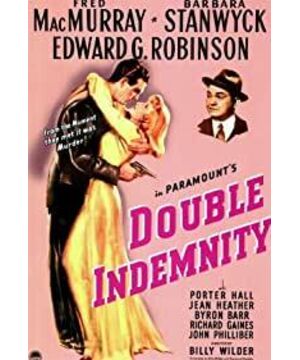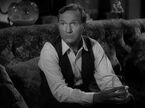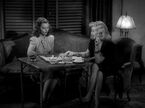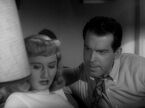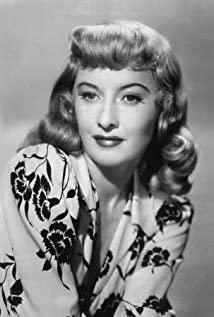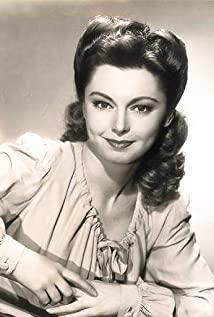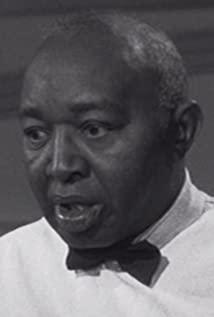If "Double Indemnity" is viewed as a Sherlock Holmes story, the audience will be greatly disappointed. The male protagonist admitted at the beginning of the film that he was the murderer, and even confessed the motive for the murder, for money and for women. There is nothing special about it, it is the same in the past and the present, and for both, people will always do a lot of crazy things. The only suspense is, why did things get this far? This is Billy, he doesn't play the last minute game of finding the murderer with the audience, he always tells us the truth in advance, just like in "Battlefield", he puts the searchlight on the spy's face early, leaving The question is, how to get rid of him? Many years later, Hitchcock did the same. In "Phone Murder", the director explained who was the mastermind of the murder at the beginning, but the question is, how to make him confess?
In the development of the plot of "Double Indemnity", it is not so much to detect cases, but to investigate human nature, and put people in the whirlpool of money and beauty to experiment to see how much people can pickle. The hero, Walter, is an insurance salesman. When he sells private car insurance, he begins his routine hunting. The mansion and the wife who is alone in the empty house, everything will come naturally. It's just that this time Walter didn't expect that he would use others as prey, and others would also use him. Phyllis was originally Ditson's wife's nurse, and came to power after killing her first wife. But what she didn't expect was that Ditson's business continued to decline, and he left the inheritance to his daughter Lola, born to his ex-wife, so Phyllis had the evil idea of murdering her husband and Lola. An insurance salesman who is obsessed with her slams into the door himself, prompting her to plan not only to pocket the estate, but also to get a lucrative insurance payout.
Walter knew what Phyllis was up to because of his professional sense of smell, but human nature was like this, and he succumbed to the temptation of beauty and money. Maybe there are other reasons: Walter knows the business too well, and has seen his old partner Keith debunk too many insurance scams. As a trader for many years, Walter couldn't help itching. He wanted to know if he could hide it from the sky, and then he had the illusion that he could control the overall situation. So he and Phyllis planned what they thought was a "perfect" murder. But there is no such thing as a perfect crime in the world. In today's view, the plan is not a mere sparse, but full of loopholes. Even if there was no fingerprint recognition technology and surveillance camera equipment at that time, Walter still revealed too many tricks. For example, during his crime, if someone came to visit or called him, then his alibi would be self-defeating, even if he put a card next to the bell, in this way you can know that someone has come to him, But it didn't help, he couldn't justify it, because he had no way of knowing when the visit or the call came. Not to mention, how he made sure to get in and out of his place without any witnesses. The "secret" connection between Walter and Phyllis is even more like a child's play. If the private detective who is following can't even find it, he should change his career. However, the arrangement of the film is such that the audience has nothing to do. Moreover, as mentioned earlier, the key to this film is not how meticulous the crime is without making mistakes, not how to crack the case, and how to advance it layer by layer, but to reveal how ugly human nature can become under all kinds of temptations. Blind obedience and dissatisfaction.
It's not enough for the hero and heroine to kill for money, and Walter has to pay double compensation, so it is necessary to create the illusion that Ditson died on the train track, and add the train unexpectedly! Falling from the rear of a 15 mph train and breaking your neck is very unlikely: 15 miles is 24 kilometers, or 6 meters per second. If you run 100 meters in 17 seconds, you will You can see how slow the train is. To rule out suicide also means to rule out the possibility of an accident, leaving only murder. The insurance company refused to pay compensation. In order to make a claim, Phyllis will take the insurance company to court, not the police, but herself will initiate judicial proceedings. Once the incident occurs, not only will the money not be obtained, but the murderer will enter the gas chamber himself. Walter realizes the problem, decides to stop and persuades her to step back. In fact, they are not on the edge of the cliff, but in the process of falling. Phyllis refuses to give up the thirst-quenching booze and insists on taking the insurance company to court. But in fact, there is no better choice. If she retreats halfway, she will not attack herself.
The shrewd Keith has already deduced the crime process closely at this moment, but he has not determined who the accomplice who helped Phyllis is. Maybe it was because of his colleagues for many years, maybe because he regarded Walter too well, maybe because he was reluctant to expose Walter for the time being (everything became clear after judicial intervention). In short, after a brief investigation of Walter's alibi, Keith did not pursue it. But there are indications that he not only suspects Walter, but tries to wake him up before he goes the wrong way: Keith wants Walt to be transferred to the office and picks up a phone call from Phyllis just in the middle of the conversation. Asked to commit murder that night. Perhaps, Keith didn't know Walter because he was too close, but he knew his character too well. Keith knew that sooner or later this kind of work and environment would lead Walter astray, so he tried to turn him back at a critical moment, but to no avail.
At this time, Walter learned through Lola that her boyfriend Nino went to Phyllis every day. At this time, the game of human nature came to the forefront. In this case, Walter doesn't know what medicine is sold in Phyllis' gourd, so he can only make the worst guess, if Phyllis can seduce himself, why can't she seduce Nino? In this way, it is very likely that Phyllis and Nino planned all this, and she only played the role of killer and scapegoat. After all, it was herself who killed Ditson with her own hands. As a result, even if Walter eavesdropped on Keith's memo and learned that the police had locked down Phyllis and Nino, he wasn't the least bit happy to be temporarily freed from suspicion. On the contrary, he cannot predict what Phyllis and Nino will say in court or when the police investigate. Taking this as a premise, Walter can easily make a judgment: if they are excused, then the money and women are Nino's, and they will get nothing; if they are convicted, it is difficult to guarantee that Phyllis is a person. sell yourself. So, he came up with an even crazier plan: kill Phyllis and blame Nino. As long as Phyllis is silent forever, then no one can prove what he did.
So, the "wonderful" final scene was staged. This is the case with crime. There is no turning back when the bow is opened. If you embark on the road of no return, you will make mistakes again and again, leaving more loopholes in order to cover up a loophole. A partnership between two people will only accelerate the exposure, which is because of the psychology of the game. When the prisoners are tried, they will be tried separately. If one is recruited and the other is not recruited, the sentence of the recruited person will be reduced, and the crime of not recruited will be increased by one grade. Therefore, the prisoners have to recruit for the sake of maximizing their interests. Keith uses the metaphor of two people riding a bus to express roughly the same truth, showing that there is only one dead end, and the end is the grave. In this kind of predicament, getting rid of the other party first seems to be the "best" choice, but it's still the same reason, you don't trust the other party, and the other party won't believe you. Walter came to Phyllis's house, and when he closed the window and pulled the curtains, he had already made a killing attempt, but Phyllis made the first shot and fired the first shot. The next plot is a bit bloody. Phyllis suddenly made a 180-degree turn and refused to shoot a second shot, and the reason was so old-fashioned that she really fell in love with Walter. The latter did not appreciate it, and shot her to death with two consecutive shots? ! Maybe femme fatale really doesn't deserve to live in the world. Later, Walter prevented Nino from entering Phyllis's house to avoid being suspected. He could have fled directly to Mexico himself, but returned to the office to record the final memo.
Perhaps, a more reasonable explanation is that, in some ways, Walter did misunderstand Phyllis, she just wanted to encourage Nino to kill Lola and take the inheritance, but there was really no emotional entanglement with Nino. Walter seems to care more about this, so he tests Nino at the last moment and asks him to call Lola, if Nino goes, it proves that he only has Lola in his heart, if Nino insists on going in to see Fili Silk, then everything is self-evident, and it is just right to blame him. As a result, Nino really went to call Lola, and Walter realized that he had misunderstood Phyllis, but it was too late. This is game theory: the prisoner may not move, but he cannot guarantee that the other prisoner will not move, and as a result he moves, but in the end he finds that the other prisoner does not move...
Although the audience will hold the belief that Skynet is full and sloppy, but when they are brought into the film, they will inevitably suffer from Stockholm Syndrome, sweating for the hero and heroine when they commit crimes, and always when they are exposed Involuntarily tense up. The director relies on this to control the rhythm of the film, and it and morality continue to "stimulate" the audience from two aspects. A film full of instructive meaning can also be ups and downs, but this effect is not obtained by finding the murderer, but by analyzing and displaying a criminal psychology. Perhaps, this is the most worthy of reference for this film. place.
View more about Double Indemnity reviews


